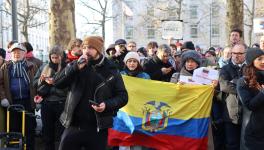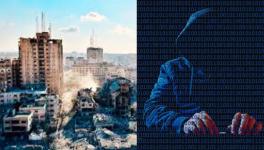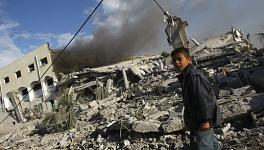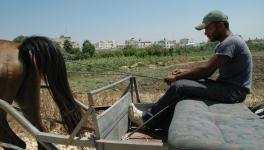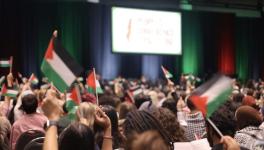'The Coverage Continues': Palestinian Journalists Vow to Carry Forward Abu Akleh's Legacy
It's been almost two weeks since Faten Elwan woke up to the dreadful news that her colleague and close friend Shireen Abu Akleh had been fatally shot in the early morning of May 11. Abu Akleh, a senior correspondent with Al Jazeera Arabic, was covering an Israeli military raid in the Jenin refugee camp in the occupied West Bank on that fateful day.
"Now we start to realize and it just doesn't make sense," says Elwan, a Palestinian journalist who lives in Ramallah and currently works for a youth website. "We just pick up the phone and call her, we are not over that habit yet."
Elwan used to work for US-based Alhurra TV and for more than 15 years often reported side-by-side with Abu Akleh. "What was so special about her was that she will never go to any place just thinking of a mission that she quickly needs to finish," says Elwan, still speaking in the present tense.
Abu Akleh, who was just a few years older, took Elwan under her wing when she started out in journalism. Elwan remembers her colleague always looked for the "human angle" in her story. "She respects the place, she makes people around her feel comfortable to talk and then she starts the work."
Dispute over circumstances continues
The Qatar-based Al Jazeera network, for which the Palestinian-American journalist worked for over 20 years, and the Palestinian Authority, which administers parts of the occupied West Bank, have blamed Israel for what they believe was the intentional killing of the well-known journalist. Al Jazeera said on Thursday that it assigned a legal team to refer it to the International Criminal Court in The Hague.
While the Israeli Defense Force (IDF) has not ruled out that she was accidentally killed by an Israeli sniper stationed around 200 meters away, the army argues that she may have been shot by indiscriminate Palestinian gunfire. Eyewitness accounts from Palestinian journalists and bystanders contradict the claim that there was an exchange of fire when the journalist was killed.
In the findings of an initial investigation, published two days after the incident, the IDF concluded that "it is not possible to unequivocally determine the source of gunfire which hit and killed Ms. Abu Akleh." The IDF has denied accusations of deliberately targeting journalists.
Too close to home for many journalists
The death of Abu Akleh, who was well-known and respected beyond the Palestinian Territories, has sent shockwaves throughout the journalistic community.
Many among the younger generation of Palestinian journalists grew up watching her reporting and she is endearingly remembered for her famously calm and collected sign-off, no matter the story.
"She was our face at Al Jazeera, and for us media students, we learned a lot from her, and we owe her a lot," says 20-year-old Diana Shweiki, a third-year student in media studies at Al Quds University, a Palestinian university in Jerusalem.
But her death also raises difficult questions about reporting from a conflict zone. "There is no more safety for journalists," says Shweiki.
The Committee to Protect Journalists says it has confirmed the killing of 19 journalists in Israel and the Palestinian Territories since 2000, although other organizations such as Paris-based Reporters Without Borders puts that figure higher.
"Wherever there's conflict, there's danger," says Walid Batrawi, a former colleague of Abu Akleh's at Al Jazeera English. Batrawi, a Palestinian journalist, has made it his mission to train Palestinian journalists who work in hostile environments.
"The basic rule for journalists is to be aware and to take all cautious measures and considerations. Mostly those who work for foreign media would have the chance to be trained in protecting themselves, even though, you are not protected 100 percent."
Batrawi says he is still in denial that his former colleague, who was known for being extra careful and cautious and never endangering her team, was killed while doing her job. She was clearly identifiable with a press flak jacket and helmet.
Following her killing, field reporting continues for Palestinian journalists who live with the realities of the conflict and under a military occupation every day.
"The slogan that Palestinian journalists are using right now after Shireen's death is 'The coverage continues,'" Batrawi says. "That is a huge message."
Calls for independent investigation
Focus remains on whether those responsible for the killing will be held to account. The United Nations, the United States and several European countries have called for an independent probe into the killing of the Palestinian-American journalist.
Several media outlets such as US network CNN and news agency Associated Press (AP), or investigative collective Bellingcat have made their own investigations, speaking with eyewitnesses, cross-referencing sounds, analyzing video material and consulting forensic experts, suggesting that Abu Akleh was killed by the Israeli military.
On Thursday, the Palestinian Authority's chief prosecutor, Akram Al Khatib, laid out the findings of its investigation in Ramallah, concluding that the journalists were directly fired at by Israeli snipers. According to the report, forensic evidence suggests that Abu Akleh was fatally shot in the head from behind while attempting to escape from Israeli sniper fire.
The Palestinian Authority (PA) has previously said that it won't cooperate with a joint investigation given the mistrust between both parties. Al Khatib reiterated that the bullet that killed Abu Akleh will not be handed over to Israel as the Israeli military has requested.
Israeli Defense Minister Benny Gantz replied to the inquiry by the Palestinian Authority that "any claim that the IDF intentionally harms journalists or uninvolved civilians, is a blatant lie." He also accused the Palestinian Authority and CNN of attempting "to undermine the ability to achieve peace and stability in the region."
'You have enough burden of pain in your heart'
Some of Abu Akleh's friends and colleagues are weary, concerned that accountability may never come and the violence that accompanied the journalist's funeral in east Jerusalem further traumatized them.
Elwan says she was shocked by the heavily armed Israeli border police charging into mourners and beating pallbearers preparing to take Shireen's coffin from Saint Joseph's Hospital to the church in the Old City.
"A dead body in a coffin with her loved ones around her. In every country in the world, it's only your simplest human right To do this with respect, in peace, you have enough burden of pain in your heart," says Elwan who remained next to Shireen's coffin.
Edited by: Sean Sinico
Get the latest reports & analysis with people's perspective on Protests, movements & deep analytical videos, discussions of the current affairs in your Telegram app. Subscribe to NewsClick's Telegram channel & get Real-Time updates on stories, as they get published on our website.










